Generation X (1991)
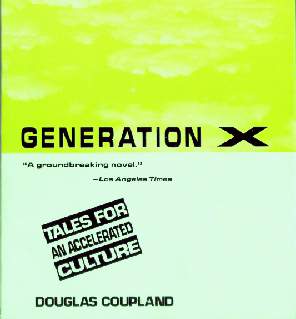 Coupland's works focus on the experiences of young people
in contemporary North American society. The novel Generation X
is the story of Andy, Clair, and Dag, three "twenty-somethings"
who live Palm Springs. Overeducated for their current jobs, the three
are disillusioned by the greediness, exploitation, and frenzied pace they
experience in the corporate worlds. In an attempt to keep themselves entertained,
Andy, Clair and Dag tell each other stories ranging from fantastic to
the tragic. In addition to describing his characters' lives, Coupland
also incorporates into Generation X numerous sayings and definitions
which are printed along the margin of each page. For example, he coins
such phrases as "Eroticize Intelligence" and "Re-Invent
the Middle Class," and defines "Lessness as "philosophy
whereby one reconciles oneself to diminishing expectations."
Coupland's works focus on the experiences of young people
in contemporary North American society. The novel Generation X
is the story of Andy, Clair, and Dag, three "twenty-somethings"
who live Palm Springs. Overeducated for their current jobs, the three
are disillusioned by the greediness, exploitation, and frenzied pace they
experience in the corporate worlds. In an attempt to keep themselves entertained,
Andy, Clair and Dag tell each other stories ranging from fantastic to
the tragic. In addition to describing his characters' lives, Coupland
also incorporates into Generation X numerous sayings and definitions
which are printed along the margin of each page. For example, he coins
such phrases as "Eroticize Intelligence" and "Re-Invent
the Middle Class," and defines "Lessness as "philosophy
whereby one reconciles oneself to diminishing expectations."
Shampoo Planet (1992)
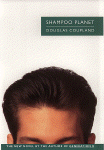 While Generation X centers on "twenty-somethings,"
Shampoo Planet focuses on the teenagers of the 1990s, or, according
to Coupland, "The Global Teens." The protangonist of the story,
Tyler Johnson, is torn between his desire to become part of affluent,
corporate life and what he sees as his personal responsibility to save
the environment and make the world a better place in which to live.
While Generation X centers on "twenty-somethings,"
Shampoo Planet focuses on the teenagers of the 1990s, or, according
to Coupland, "The Global Teens." The protangonist of the story,
Tyler Johnson, is torn between his desire to become part of affluent,
corporate life and what he sees as his personal responsibility to save
the environment and make the world a better place in which to live.
Life After God (1994)
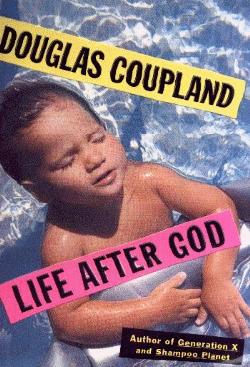 In his short story collection, Life
after God, Coupland shifts his attention back to the "twenty-somethings"
to address religious and spiritual concerns. In the epigraph to this work,
Coupland writes, "You are the first generation to be raised without
religion," and the stories in the collection often portray characters
filled with hopelessness, despair, and lack of faith. The story "1,000
Years (Life after God)," for example, centers on a man who decides
to stop taking the medication prescribed for his depression. While not
necessarily religious, the man ultimately realizes: "I need God to
help me give, because I no longer seem capable of giving ... to help me
to love, as I seem beyond being able to love." Coupland also addresses
such issues as divorce, nuclear annhilation, and the pain of romantic
love in this volume.
In his short story collection, Life
after God, Coupland shifts his attention back to the "twenty-somethings"
to address religious and spiritual concerns. In the epigraph to this work,
Coupland writes, "You are the first generation to be raised without
religion," and the stories in the collection often portray characters
filled with hopelessness, despair, and lack of faith. The story "1,000
Years (Life after God)," for example, centers on a man who decides
to stop taking the medication prescribed for his depression. While not
necessarily religious, the man ultimately realizes: "I need God to
help me give, because I no longer seem capable of giving ... to help me
to love, as I seem beyond being able to love." Coupland also addresses
such issues as divorce, nuclear annhilation, and the pain of romantic
love in this volume.
Microserfs (1995)
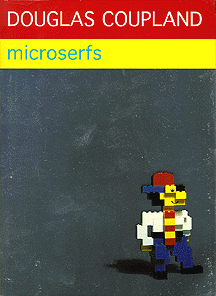 Microserfs:
a hilarious, fanatically detailed, and oddly moving book about a handful
of misfit Microsoft employees who realized they don't have lives and subsequently
become determined to get lives inside the lightning-paced world of high-tech
1990s American geek culture. Coupland gives readers an intimate, deadly
accurate, and very funny view of a way of life that is quickly becoming
the dominant way of life: friends, families, and lovers falling through
the trapdoors of the new electronic order and becoming involved in an
engaging, awkward scarmble toward love and success in a brave new world.
Microserfs:
a hilarious, fanatically detailed, and oddly moving book about a handful
of misfit Microsoft employees who realized they don't have lives and subsequently
become determined to get lives inside the lightning-paced world of high-tech
1990s American geek culture. Coupland gives readers an intimate, deadly
accurate, and very funny view of a way of life that is quickly becoming
the dominant way of life: friends, families, and lovers falling through
the trapdoors of the new electronic order and becoming involved in an
engaging, awkward scarmble toward love and success in a brave new world.
Polaroids from the Dead (1996)
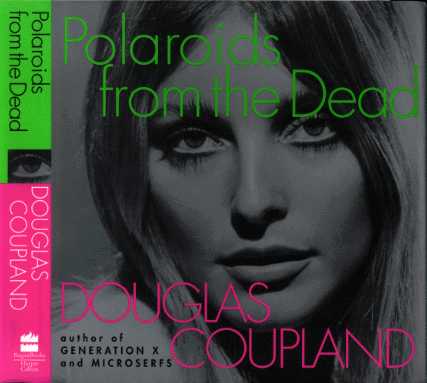 Douglas Coupland takes his sparkling literary talent in a
new direction with this crackling collection of takes on life and death
in North America - from his sweeping portrait of Grateful Dead culture
to the deaths of Marilyn Monroe, Kurt Cobain and the middle class. For
years, Coupland's razor-sharp insights into what it means to be human
in an age of technology have garnered the highest praise from fans and
critics alike. At last, Coupland has assembled a wide variety of stories
and personal "postcards" about the pivotal people and places
that have defined our modern lives. Polaroids from the Dead is
a skillful combination of stories, fact and fiction - keen outtakes on
life in the late twentieth century, exploring the recent past and a society
obsessed with celebrity, crime and death. Princess Diana, Nicole Brown
Simpson and Madonna are but some of the people scrutinized herein. By
turns hugely funny, savagely ironic and poignantly searching, this collection
has appeal for everyone cognizant of the first half of this decade and
looking for navigation in the second.
Douglas Coupland takes his sparkling literary talent in a
new direction with this crackling collection of takes on life and death
in North America - from his sweeping portrait of Grateful Dead culture
to the deaths of Marilyn Monroe, Kurt Cobain and the middle class. For
years, Coupland's razor-sharp insights into what it means to be human
in an age of technology have garnered the highest praise from fans and
critics alike. At last, Coupland has assembled a wide variety of stories
and personal "postcards" about the pivotal people and places
that have defined our modern lives. Polaroids from the Dead is
a skillful combination of stories, fact and fiction - keen outtakes on
life in the late twentieth century, exploring the recent past and a society
obsessed with celebrity, crime and death. Princess Diana, Nicole Brown
Simpson and Madonna are but some of the people scrutinized herein. By
turns hugely funny, savagely ironic and poignantly searching, this collection
has appeal for everyone cognizant of the first half of this decade and
looking for navigation in the second.
Girlfriend in a Coma (1998)
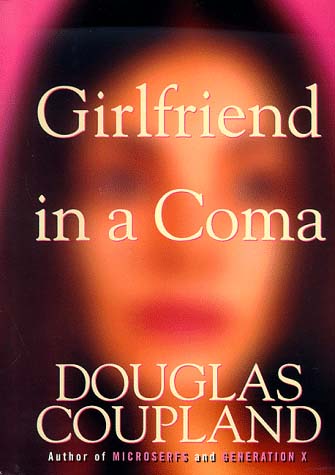 After
making love for the first time, high school senior Karen Ann McNeil confides
to her boyfriend, Richard, of the dark visions she's been suffering recently.
It's only a few hours later on that snowy Saturday night in 1979 that
she descends into a coma. Nine months after that, she gives birth to a
daughter, Megan, her child by Richard. Karen remains comatose for the
next 18 years. Richard and her circle of friends reside in an emotional
purgatory throughout the next two decades, passing through careers as
models, film special-effects technicians, doctors and demolition experts
before finally being reunited while working on a conspiracy-driven supernatural
series. Upon Karen's reawakening, life grows as surreal as the television
show. Strange, apocalyptic events begin to occur. Later, amid the world's
rubble, Karen, Richard and their friends attempt to restore their own
humanity.
After
making love for the first time, high school senior Karen Ann McNeil confides
to her boyfriend, Richard, of the dark visions she's been suffering recently.
It's only a few hours later on that snowy Saturday night in 1979 that
she descends into a coma. Nine months after that, she gives birth to a
daughter, Megan, her child by Richard. Karen remains comatose for the
next 18 years. Richard and her circle of friends reside in an emotional
purgatory throughout the next two decades, passing through careers as
models, film special-effects technicians, doctors and demolition experts
before finally being reunited while working on a conspiracy-driven supernatural
series. Upon Karen's reawakening, life grows as surreal as the television
show. Strange, apocalyptic events begin to occur. Later, amid the world's
rubble, Karen, Richard and their friends attempt to restore their own
humanity.
Lara's Book: Lara Croft and the Tomb Raider Phenomenon (1998)
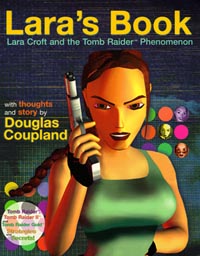 Lara's
Book chronicles the amazing popularity of Lara Croft (the lovely leading
lady of the Tomb Raider series). Douglas Coupland gves his thoughts on
the phenomenon and an original story about Lara. The book also includes
thousands of pictures of Lara from around the world, some never before
seen in print. Plus, strategy guide author Kip Ward has created new gameplay
strategies Tomb Raider, Tomb Raider II, and Tomb Raider Gold for exclusive
release in Lara's Book.
Lara's
Book chronicles the amazing popularity of Lara Croft (the lovely leading
lady of the Tomb Raider series). Douglas Coupland gves his thoughts on
the phenomenon and an original story about Lara. The book also includes
thousands of pictures of Lara from around the world, some never before
seen in print. Plus, strategy guide author Kip Ward has created new gameplay
strategies Tomb Raider, Tomb Raider II, and Tomb Raider Gold for exclusive
release in Lara's Book.
Miss Wyoming (1999)
 Susan
is a former child-beauty-pageant contender. John is a hard-living movie
producer. She walks away from a plane crash without so much as a scratch.
He comes away from a near-death experience with a unique, vivid plan.
Susan refuses to spend one more day peddling herself for cheesy TV sitcom
parts and takes advantage of a very weird situation to disappear. John
turns his back on a hedonistic life making blockbuster action flicks.
Shedding their self-made identities, each sets out on an uncharted course
across the Gap-clogged, strip-mall landscape of California, searching
for the thing--Love--that neither has ever really known, but that they
now think they just might, actually, desperately want. Assisting Susan
and John are a blackmailing pageant mom, a pair of suburban eggheads,
a rust-belt refugee, and a salad bar of other twentieth-century Americans
who all share the dream of one day taking center stage.
Susan
is a former child-beauty-pageant contender. John is a hard-living movie
producer. She walks away from a plane crash without so much as a scratch.
He comes away from a near-death experience with a unique, vivid plan.
Susan refuses to spend one more day peddling herself for cheesy TV sitcom
parts and takes advantage of a very weird situation to disappear. John
turns his back on a hedonistic life making blockbuster action flicks.
Shedding their self-made identities, each sets out on an uncharted course
across the Gap-clogged, strip-mall landscape of California, searching
for the thing--Love--that neither has ever really known, but that they
now think they just might, actually, desperately want. Assisting Susan
and John are a blackmailing pageant mom, a pair of suburban eggheads,
a rust-belt refugee, and a salad bar of other twentieth-century Americans
who all share the dream of one day taking center stage.
City of Glass (2000)
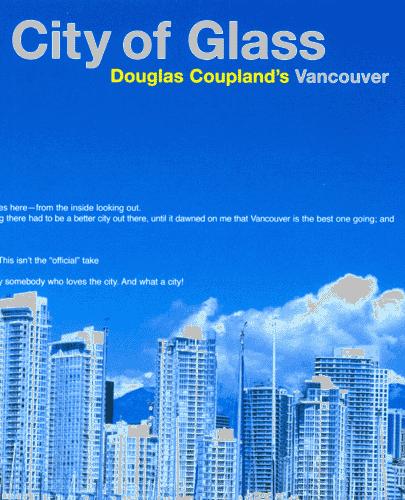 A
stylish little book of text and image in which Douglas Coupland captures
the essence of his home town, Vancouver. The world sees Vancouver as a
beautiful city harbouring a special secret -- a snowboarding Pacific sphinx,
brash and free of historical luggage. The city is also the birthplace
of cultural phenomena such as Greenpeace, cyberpunk, the schism of Generation
X, The X Files and now, Culture Jamming. So -- what is Vancouver really
like? What does Vancouver feel like from the inside? Electric, provocative,
witty and, above all, eerily perceptive, here is Vancouver inside out,
from the Grouse Grind to glass towers, First Nations to feng-shui, Kitsilano
to Cantonese. Here's life in the social laboratory of extreme politics
and extreme sports, where Europe meets Asia meets indigenous, and where
the notion of Paradise at the end of a Canadian rainbow is rewritten every
day. Coupland's 25,000-word text, broken up into 49 personal categories,
is matched with a like number of images reflecting the unexpected city:
archival photographs, "beauty" shots, images from internationally known
photo-artists, and ephemera such as Campbell's soup cans with Cantonese/English/French
labels ( ... the only such cans in the world). Full of inimitable insights,
this unique little book is designed by Coupland and Vancouver's Judith
Steedman in the manner of underground Japanese magazines. Unlike any take
on Vancouver that anyone has seen before, Coupland's exploration of his
home city will intrigue his broad and growing international audience.
A
stylish little book of text and image in which Douglas Coupland captures
the essence of his home town, Vancouver. The world sees Vancouver as a
beautiful city harbouring a special secret -- a snowboarding Pacific sphinx,
brash and free of historical luggage. The city is also the birthplace
of cultural phenomena such as Greenpeace, cyberpunk, the schism of Generation
X, The X Files and now, Culture Jamming. So -- what is Vancouver really
like? What does Vancouver feel like from the inside? Electric, provocative,
witty and, above all, eerily perceptive, here is Vancouver inside out,
from the Grouse Grind to glass towers, First Nations to feng-shui, Kitsilano
to Cantonese. Here's life in the social laboratory of extreme politics
and extreme sports, where Europe meets Asia meets indigenous, and where
the notion of Paradise at the end of a Canadian rainbow is rewritten every
day. Coupland's 25,000-word text, broken up into 49 personal categories,
is matched with a like number of images reflecting the unexpected city:
archival photographs, "beauty" shots, images from internationally known
photo-artists, and ephemera such as Campbell's soup cans with Cantonese/English/French
labels ( ... the only such cans in the world). Full of inimitable insights,
this unique little book is designed by Coupland and Vancouver's Judith
Steedman in the manner of underground Japanese magazines. Unlike any take
on Vancouver that anyone has seen before, Coupland's exploration of his
home city will intrigue his broad and growing international audience.
All Families are Psychotic (2001)
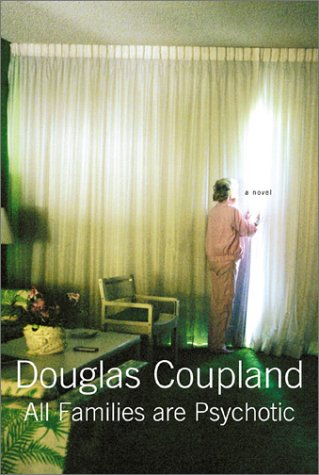 The
most disastrous family reunion in the history of fiction. The last time
the wildly dysfunctional Dummond family of Vancouver got together, gunplay
was on the menu. Only the fact that their one shining star, Sarah the
astronaut, is about to be launched into space at Cape Canaveral tempts
them to try togetherness again. The state of Florida may never recover
from the Drummonds' version of fun in the sun. Everyone tries really hard
to get along. But when the reformed wastrel and oldest brother Wade sets
out to help his estranged dad out of a financial jam, he sets in motion
a hilarious series of mishaps and coincidences that spins quickly out
of control. The story unfolds at lightning speed, hurling the Drummonds
apart with the energy of a rocket blast. Adultery, hostage-taking, a purloined
letter, heart attacks at Disney World, bankruptcy, addiction, blackmarket
negotiations-Coupland piles on one deft and comic plot twist after another,
leaving you reaching for your seat-belt and waiting for the crash. When
the crash comes, it is surprisingly sweet.
The
most disastrous family reunion in the history of fiction. The last time
the wildly dysfunctional Dummond family of Vancouver got together, gunplay
was on the menu. Only the fact that their one shining star, Sarah the
astronaut, is about to be launched into space at Cape Canaveral tempts
them to try togetherness again. The state of Florida may never recover
from the Drummonds' version of fun in the sun. Everyone tries really hard
to get along. But when the reformed wastrel and oldest brother Wade sets
out to help his estranged dad out of a financial jam, he sets in motion
a hilarious series of mishaps and coincidences that spins quickly out
of control. The story unfolds at lightning speed, hurling the Drummonds
apart with the energy of a rocket blast. Adultery, hostage-taking, a purloined
letter, heart attacks at Disney World, bankruptcy, addiction, blackmarket
negotiations-Coupland piles on one deft and comic plot twist after another,
leaving you reaching for your seat-belt and waiting for the crash. When
the crash comes, it is surprisingly sweet.
Note: Major Works is partly reprinted from Contemporary Literary Criticism. I claim no copyright over it.
Works of Coupland by others
Masayo Ogura (Japanese)
- Generation X
- Translated by Hisashi Kuroma (One of the most popular translators in Japan. Now deceased.). Published by Kadokawa-Shoten in 1992.
- Shampoo Planet
- Translated by Yoshinobu Morita. Published by Kadokawa-Shoten in 1995.
- Life after God (In the Desert)
- Translated by Ken-ichi Eguchi. (Literary Magazine SUBARU May, 1994) Published by Shueisha.